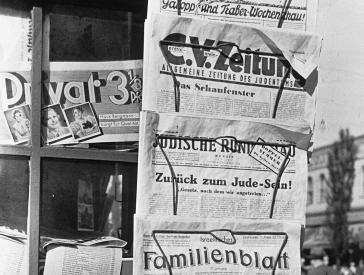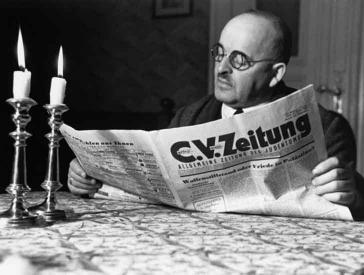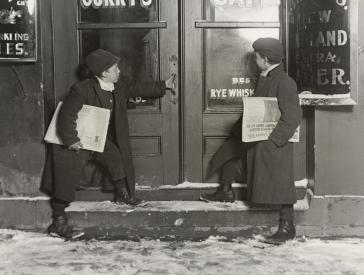Cultural Program in February 2014
Press Invitation
Press Release, Tue 28 Jan 2014
Focus on "Theresienstadt Ghetto"
Program accompanying the premiere of the "Defiant Requiem" on 4 March
27 February
Reading
As if it were a Life. Reading from the "Tatsachenbericht" by Philipp Manes
With actor Frank Riede, annotated by Ben Barkow (Ed.)
In February 1944, one and a half years after his deportation from Berlin, the tradesman Philipp Manes began a comprehensive report about life in the Theresienstadt Ghetto. Manes headed the service that planned and organized more than 500 lectures, readings, and poetry competitions during his more than two-year imprisonment. His records covering 986 pages give a detailed picture of the camp’s structure, describe the different living conditions of the Czech and German inmates, portray numerous people, and describe the circumstances of the transports to Auschwitz, which also included himself and his wife in October 1944.
A cooperation with the Wiener Library, London
Location: Academy, Hall
Time: 7.30 pm
Admission: free
- Kontakt
-
Press office
T +49 (0)30 259 93 419
presse@jmberlin.de
- Address
Jewish Museum Berlin Foundation
Lindenstraße 9–14
10969 Berlin
27 February to 21 April
Special Exhibition
Bedřich Fritta
The exhibition presents a selection of works by the graphic artist Bedřich Fritta that originated between 1942 and 1944 in the Theresienstadt ghetto.
Location: Libeskind Building, ground level, Eric F. Ross Gallery in the permanent exhibition
Admission: with the museum ticket
27 February to 23 March
Presentation: No Butterflies Fly Here
Children and Youths at the Theresienstadt Ghetto
The library and archives of the Jewish Museum Berlin present their collections of books, diaries, letters, and drawings by children and young people who lived in the Theresienstadt Ghetto.
Location: Academy
Admission: free
1 March
Film
Transport from Paradise (Transport aus dem Paradies / Tránsport z raje)
With an introduction by Hanno Loewy, film scholar and director of the Jewish Museum Hohenems
Directed by Zbyněk Brynych, CSSR 1963, 98 min.
Zbyněk Brynych, known later in West Germany as the style-defining director of "Derrick" and "Der Alte", addresses in his feature film shot in CSSR the forced "involvement" by the Nazis of victims in the process of their own destruction. The sometimes surreal, sometimes bitingly satirical film about the Theresienstadt Ghetto and its Jewish elder "Marmulstaub" is based on Arnost Lustig’s autobiographical book "Nacht und Hoffnung" (Night and hope). "Transport aus dem Paradies" (Transport from paradise) was one of the first films of the 1960s to explore without moral ambiguity the shadiness of the relationship between victim and perpetrator under the despotic rule of absolute domination and destruction. An historical documentary feature film that merits rediscovery.
Location: Old Building, second level, Great Hall
Time: 7.30 pm
Admission: free
2 March
Symposion
Art and Culture in the Theresienstadt Ghetto
The symposion explores in four lectures the history of the "exception ghetto" Theresienstadt from four different angles. Wolfgang Benz, Berlin, speaks about the Theresienstadt Ghetto as a place of deception and destruction; Inka Bertz, Berlin, considers the visual artists imprisoned there; Anna Hájková, Warwick, analyzes the ghetto as a place of unequals , and Hanno Loewy , Hohenems, examines the cinematic and photographic propaganda in the Theresienstadt, Warsaw, and Lodz ghettos.
11 am: Theresienstadt - A Story of Deception and Destruction (Wolfgang Benz, Berlin)
12 pm: Jeunesse Dorée of the Holocaust - The Ghetto as a Society of Unequals (Anna Hájková, Warwick)
1 pm: Lunch
2 pm: Drawing in the Ghetto Theresienstadt (Inka Bertz, Berlin)
3 pm: Ghetto and Propaganda or: How Differently Can You Portray Hell? A Reflection on Theresienstadt, Warsaw, and Lodz in Nazi Media (Hanno Loewy , Hohenems)
4.30 pm: Reception
Location: Old Building, second level, Great Hall
Time: 11 am to 5 pm
Admission: free
3 March
Documentary Film
"Defiant Requiem"
Director: Doug Shultz, USA / UK / Czech Republic 2012, 85 min, English, original version
The documentary film "Defiant Requiem" tells the story of Czech conductor and pianist Rafael Schächter and his production of Verdi’s Messa da Requiem in Theresienstadt, more than 70 years ago. Director Doug Shultz combines the recollections of surviving members of Schächter’s choir with archival material, and documents the rehearsals of Murry Sidlin’s production "Defiant Requiem" in Theresienstadt today.
Location: Old Building, ground level, Auditorium
Time: 7.30 pm
Admission: free
4 March
Concert Drama
"Defiant Requiem"
Verdi’s Messa da Requiem at the Theresienstadt Ghetto
The concert drama "Defiant Requiem" is dedicated to the Czech conductor and pianist Rafael Schächter, who performed Verdi's Messa da Requiem with hundreds of prisoners in the Theresienstadt ghetto around 70 years ago.
For the people in the Theresienstadt ghetto, music was an element of self-assertion in a daily camp life shaped by humiliation, misery, illness, and death. Initially performed in secret, the concerts were later abused by the Nazis for propaganda purposes. Rafael Schächter and almost all members of the choir were murdered by the Nazis.
The American conductor Murry Sidlin remembers with the "Defiant Requiem" the people in Theresienstadt for whom the Requiem and work with Rafael Schächter became a means of internal resistance. In his production, he links Verdi’s Requiem with film footage and eyewitness accounts from members of the choir. Seventy years after the last concert in Theresienstadt, we would like to remember the people who contributed under the most extreme conditions to a diverse cultural life in the Theresienstadt ghetto.
Artists:
Murry Sidlin (conductor), the Berlin Konzerthaus Orchestra, the Young Ensemble Berlin Choir and the Vocal Academy Berlin (director: Frank Markowitsch), Aga Mikolaj (soprano), Gerhild Romberger (mezzo soprano), Steven Tharp (tenor) István Kovács (bass), Iris Berben and Ulrich Matthes (speakers)
Sponsored by the German Capital Culture Fund (Hauptstadtkulturfond) and the "Remembrance, Responsibility, and Future" Foundation
Location: Konzerthaus Berlin, Gendarmenmarkt
Time: 8 pm
Tickets: 15 - 42 € (plus booking fee)
Advance Booking: tel. +49 (0)30 20309 2101 or ticket@konzerthaus.de
"Defiant Requiem" is presented by arrangement with The Defiant Requiem Foundation.
The Jewish Museum Berlin and the Defiant Requiem Foundation thank all supporters and partners.
Under the patronage of:
Die Beauftragte der Bundesregierung für Kultur und Medien
Prof. Monika Grütters MdB
Staatsministerin bei der Bundeskanzlerin
S.E. Dr. Rudolf Jindrák
Botschafter der Tschechischen Republik in Deutschland
Klaus Wowereit
Regierender Bürgermeister von Berlin
Dr. Martin Salm
Vorstandsvorsitzender der Stiftung "Erinnerung, Verantwortung und Zukunft"
Dr. Dieter Graumann
Präsident des Zentralrats der Juden in Deutschland
Dr. h.c. Nikolaus Schneider
Vorsitzender des Rates der Evangelischen Kirche in Deutschland (EKD)
Erzbischof Dr. Robert Zollitsch
Vorsitzender der Deutschen Bischofskonferenz
Supported by:
Hauptstadtkulturfonds
Foundation "Remembrance,Responsibility and Future"
Gesellschaft der Freunde und Förderer der Stiftung Jüdisches Museum Berlin e.V.
Friends of the Jewish Museum Berlin
Exclusiv- Partner:
Volkswagen AG
Media Partners: rbb Kulturradio, rbb Fernsehen, tip Berlin, Jüdische Allgemeine
Special Exhibitions and Accompanying Program
Extended until 1 June
Tonalities. Jewish Women Ceramicists from Germany after 1933
Margerete Heymann-Loebenstein (later Marks) was a well-known ceramics designer and co-founder of the Haël ceramic workshop in Velten, around 25 miles north of Berlin. In 1933, she was denounced by the Nazis for "subversive activities" and was forced to give up her company. Haël was sold to a Nazi party member who invited the young Hedwig Bollhagen to take over as artistic director.
The showcase exhibition follows the life path of Grete Loebenstein and other Jewish ceramicists – among them Hedwig Grossmann, Hanna Charag-Zuntz, and Eva Samuel – who began their careers in Palestine and today are considered the founding mothers of modern Israeli ceramic art.
Location: Libeskind Building, basement, Rafael Roth Learning Center
Admission: with the museum ticket
22 November to 23 March
In an Instant. Photographs by Fred Stein
Born as son of a rabbi in Dresden in 1909, Fred Stein qualified as a lawyer there and then emigrated to Paris in 1933 and to New York in 1941. In search of a new professional perspective, he opted under the difficult conditions of exile for photography, which had been his hobby until then.
Besides numerous street views of Paris and New York, Fred Stein made over 1,200 portraits, among them well-known personalities such as Hannah Arendt, Albert Einstein, Thomas Mann, Salvador Dalí, Marlene Dietrich, and Willy Brandt.
He did not – like many other photographers – photograph in the studio with a big camera, but strolled through the streets with his miniature camera capturing the city and its people in brief but decisive instants. His special perspective combines his interest in everyday life with his sense for the extraordinary moment and has his particular and charismatic humor shining through time and again.
The exhibition’s more than 130 b/w photographs show a comprehensive retrospective of Fred Stein for the first time in Germany, thus making this complex work accessible to a wider public.
Location: Libeskind Building, ground level, Eric F. Ross Gallery in the permanent exhibition
Admission: with the museum ticket
Academy Programs "Migration and Diversity"
20 February
Presentation of a Study followed by Panel Discussion
Is Higher Education a Safeguard Against Racism and Antisemitism?
One common assumption is that prejudice and racist or antisemitic attitudes are found mainly in the less educated social classes. But is this actually true? How prevalent is exclusive thinking in the academic world? The results of an empirical study examining views on prejudice and the acceptance of violence against minorities with a focus on anti-Muslim and antisemitic attitudes amongst students at universities in Germany and Canada will be presented and discussed.
The study’s authors will attend: Wassilis Kassis (University of Osnabrück) and Charlotte Schallié (University of Victoria, British Columbia, Canada), and discuss with Iman Attia (Alice Salomon Hochschule), Stefanie Schüler-Springorum (Technische Universität Berlin) and Andreas Zick (Universität Bielefeld).
Chaired by Yasemin Shooman
Location: Academy, Hall
Time: 7 pm
Admission: free
Visitor Bookings: tel. +49 (0)30 25993 488 or reservierung@jmberlin.de
Talk and Conference
19 February
Address Marking the Commemorative Year 1914/2014
Ernst Piper: Night over Europe
The First World War confronted the Jewish population in many European countries with almost insoluble problems between national patriotism and solidarity across national borders. In Germany at the beginning of the war, there was hope that a truce could promote their finally being accepted as part of German society. In the end, however, the war proved to be the crucial catalyst of German-Jewish dissimilation. The historian Ernst Piper has created in "Night Over Europe" a vast cultural historical panorama of the First World War and directs his attention here to the situation of the Jewish minority.
Location: Old Building, second level, Great Hall
Time: 7.30 pm
Admission: free
27 and 28 February
Conference in English
The Connected Audience
Our society has been transformed by new technology and its use by museums have far-reaching implications in the way we experience museums, how museums themselves communicate with us, but also in how audience research can be designed and undertaken. This 2-day conference will examine innovative audience research projects which use digital media and web-based technology to better understand visitor behavior and will explore how new technology can help visitors to have a fulfilling museum experience. A series of best practice examples, ‘pecha-kucha’ presentations and high profile key-note speakers such as the leading expert John H. Falk (USA), will provide an exceptional get-together of international audience research experts and those who are keen to learn more about the use and evaluation of new technology in audience research projects.
In cooperation with KulturAgenda – Institute for Museums, Cultural Enterprises and Audiences, Institut für Museumsforschung, Visitor Studies Group UK, subsidized by the Federal Government Commissioner for Cultural Affairs and the Media.
Location: Old Building, ground level, Auditorium
Time: 10 am to 6 pm
Admission: 220 euros
Visitor Bookings: www.kulturagenda.at




